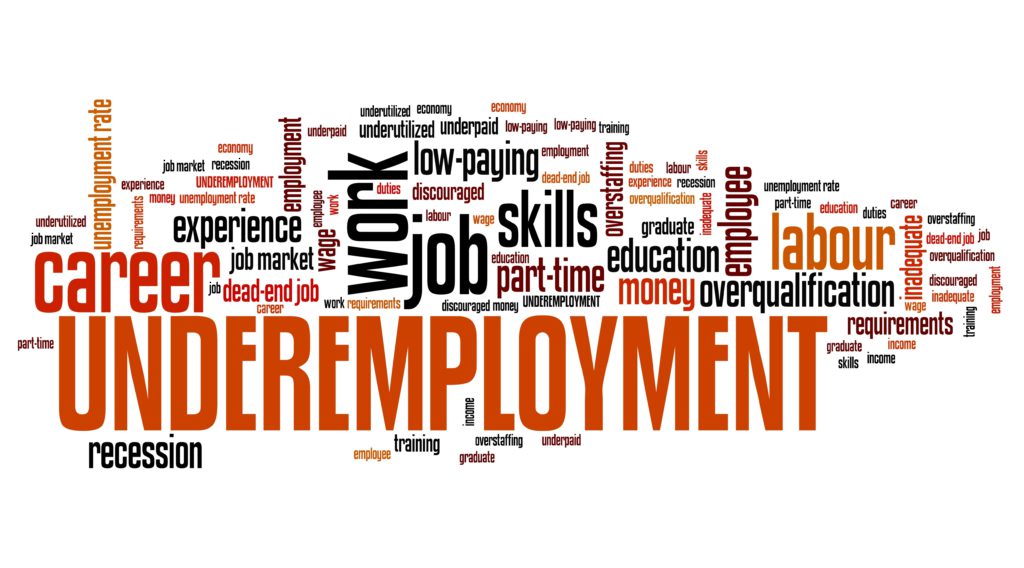Poverty is a major issue in the United Kingdom. Millions of people live below the poverty line.
In-work poverty is a particular problem, with many people in full-time employment struggling to make ends meet.
Underemployment is also a significant issue, with millions of people working fewer hours than they would like or need to.
This blog post will explore the causes and effects of these problems, and what we can do to alleviate them.
What is underemployment, in-work poverty and poverty, and how are they different from each other?
Underemployment, in-work poverty and poverty are some of the biggest issues of our time. Underemployment describes having skills that go unused when taking a job. This can lead to workers feeling undervalued, misused and demoralised in the workplace.
In-work poverty refers to the lack of good employment available to individuals. With jobs often offering low wages, few prospects and limited working hours. As someone’s skills could be inadequately utilised in this type of employment, it is difficult to progress up the career ladder.
Last but not least, poverty speaks for itself! An individual living in poverty don’t have access to job opportunities or any chance of becoming financially stable.
However, skills development through up-skilling can help improve job quality and increase financial security for many people.
Why are more and more people struggling with these issues despite having a job?
With living costs on the rise and wages failing to keep up, more and more people are struggling financially despite having a job. It’s a common misconception that anyone with a job is living comfortably. The reality is far different. One of the reasons many people living in poverty have a job is an increasing lack of skills in many areas that employers find difficult to fill.
This means that some people who may not have qualified for such roles in the past are now being found employment.However, it’s often work that doesn’t pay enough or offer hours consistent with living wage standards.
Additionally, the widening gap between living cost increase and living wage availability makes it harder for those working to make ends meet.
It’s clear that having a full-time job isn’t necessarily enough for families to escape poverty levels, and more needs to be done to bridge this gap. From ensuring appropriate salaries for individuals at every level of experience to the more robust matching of available jobs with individuals based on their skill set.
What are some of the effects of underemployment, in-work poverty and poverty on individuals and families?
Underemployment, in-work poverty and poverty can have devastating effects on individuals and families. Such financial hardship can lead to poor physical and mental health, causing extreme stress and poor well-being.
Research has found a link between poor economic circumstances and increases in depression, anxiety, and suicidal thoughts among those struggling financially.
Low incomes also bring a host of other issues like poor nutrition, housing insecurity, lack of resources such as access to medical care or education costs, or inadequate state benefits to sustain a family adequately. The combination of these conditions makes it almost impossible to escape the cycle of poverty, with long-term damage inflicted on individuals and the generations that follow them.
What can be done to help those who are struggling with these issues?
One of the most important things we can do to help those who are struggling with employability, underfunded education or lack of skills training is to reach out and offer our support. This could come in the form of sponsoring employability programmes, providing access to sustainable skills training or investing in better education for all. It is crucial that those who are struggling feel seen, loved and represented. They need to know that someone is willing to listen and lend a helping hand when needed. There’s no one-size fits all solution here. We must work together to create opportunity for everyone and build a brighter future for generations to come.
Are there any organisations or programs that can help people who are underemployed, in-work poor or living in poverty ?
Those in poverty are often overlooked, but there are many organisations and programs in existence that can help those underemployed or living in poverty. Connecting with skills and training providers, businesses, local councils, colleges and other services is a great start – not only could people gain valuable skills to further their career development, but they can also access help provided by their community.
In-work poor individuals may be able to qualify for council programmes designed to offer various forms of relief to the economically vulnerable. From housing assistance to job skills courses. Moreover, many online resources are available via national colleges offering education and skills-building across multiple industries. Seeking out the appropriate support networks can help make an immense difference in someone’s journey out of poverty.
How can we raise awareness about these issues so that more people understand what is happening and how they can help if they want to do so?
We live in an age where social media is one of the most effective ways to spread awareness about social, environmental and humanitarian issues. The challenge is being able to use social media in a way that resonates with people. We need to provide educational resources so individuals can learn more about the issue and determine how they may be able to help if they choose. Additionally, we must focus on engaging communities by providing access to education and opportunities for community involvement. This can create a ripple effect of advocacy that ultimately raises even more awareness. Therefore, if we maximise the power of social media platforms and offer those affected access to educational resources and other means of involvement, then we will have taken a great step towards ensuring the proper level of social consciousness on these social, environmental, and humanitarian issues.
In conclusion
Underemployment, in-work poverty and actual poverty affect individuals, families and communities all over the world. They are all related issues, though they may have different causes, consequences and solutions. If a person is struggling with underemployment, in-work poverty or the realities of poverty, some organisations can help to alleviate the burden.
Awareness is key to understanding these issues and finding solutions for them. If you want to help those facing such challenges in your community but don’t know where to start, sign up for our free Skillzminer package to get free educational resources, unparalleled access to jobs and marketing support to raise awareness.

